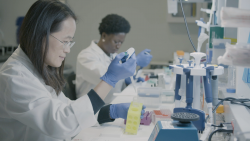You are now leaving XTANDI.com
The website you are about to visit is not owned or controlled by Astellas. Astellas are not responsible for the information or services on this site.

Allergies are a common part of everyday life, with symptoms ranging from mild discomfort at the onset of allergy seasons, to anaphylactic shock and death at exposure to certain foods. It’s a spectrum of risk that presents an immense challenge to researchers looking for a cure.

Laying the groundwork
Allergens are proteins from food, pollen or animals (to name a few common ones) that, in an allergic person, are registered in the immune system as a foreign body and trigger an immune reaction.
For most people, the management of allergies relies on over-the-counter drugs to manage symptoms. Another approach is to create tolerance by exposing the immune system to small amounts of these reaction-inducing proteins. However, this approach is very time consuming, and can take numerous shots and months of treatment for patients to see any benefits or improvements. In addition, patients with severe allergies are still at risk for deadly encounters.
But what if it was possible to change the way the immune system responds to allergens? That’s the industry-leading research underway at Astellas right now.
Re-educating the immune system
The Lysosome Associated Membrane Protein-vax (LAMP-vax) program – short for the type of protein it utilizes from the patient’s own body – is part of Astellas’ research program to investigate potential vaccines for common and sometimes life-threatening allergies. This platform was developed by Astellas’ partner, Immunomic Therapeutics, a clinical-stage biotechnology company in the U.S.
Salim Mujais, senior vice president, therapeutic area head, Immunology, Transplant, Infectious Disease, Central Nervous System and Pain, oversees the immunology team developing the LAMP-vax technology and explains how it works.
“The technology involves injecting a patient with a DNA sequence encoding two important elements: one, the patient’s own native protein; and two, the allergen protein itself,” Mujais explained.
Astellas is leading allergy prevention through partnerships
The program was spearheaded at Astellas in late 2015, when the company entered into a partnership with Immunomic Therapeutics. The research program started testing Immunomic’s LAMP-vax technology with Japanese red cedar trees, whose pollen induces allergic reactions in an estimated 25 percent of Japan’s population.
Recognizing the potential this technology may have to address multiple common and life-threatening allergies, Astellas acquired exclusive worldwide rights to research, develop, manufacture and commercialize any potential LAMP-vax products designed to treat or prevent human allergic diseases. Under this agreement, Astellas has expanded the red cedar work in Japan, in addition to researching other potential vaccines for allergies in the U.S. The most advanced of these studies is for the treatment of peanut allergies, which affect about three to five percent of children in the U.S.
Progress with peanuts
“Think of a classroom with 20 students,” Mujais said. “Statistically at least one student in that class will have a peanut allergy. And what’s the most common packed lunch? Peanut butter and jelly sandwiches.”
This example illustrates the high unmet need and pressing importance of developing effective means to reduce peanut allergies. Under Sitra Tauscher-Wisniewski, global medical lead, senior medical director, Medical Sciences, Astellas’ development team is investigating the potential therapy’s safety and efficacy, as well as its most effective dosing levels in humans.
“A severe allergic reaction or anaphylaxis can be life threatening, and that’s why working on an innovative potential treatment approach for patients is extremely rewarding,” Tauscher-Wisniewski said about the program. “It’s why I work in drug development.”
"The LAMP-vax platform has potential to broadly impact human health. We are proud of our recent work in researching a potential new approach to treating allergies," said Dr. William G. Hearl, chief executive officer of Immunomic Therapeutics.
Spearheading the future
There are currently no approved medical therapies to cure peanut allergies or prevent their effects in the event of accidental ingestion. There are also currently no DNA vaccines approved for human use leading to a number of unknowns from a development perspective.
“This project is complex – not only from the perspective of drug development, but also because there is no history to follow in terms of conversations with the Food and Drug Administration (FDA) and National Institutes of Health,” said Leticia Delgado-Herrera, executive director, global development project leader, Medical and Development. Delgado-Herrera has been involved in development strategy and approval for a number of compounds at Astellas, and she played an instrumental role in getting the peanut allergy study in humans started.
Delgado-Herrera’s team was able to obtain fast-track designation from the FDA by demonstrating the program’s promise to fill an unmet medical need and its ability to translate into the clinical setting. This milestone has allowed Astellas to expedite the program development into what it is today.
As the development team in the U.S. continues to investigate a potential peanut allergy vaccine, Astellas also plans to expand the LAMP-vax program to six additional allergens.
 |
Get only the email alerts you want.
For media inquiries and reporter requests, please email us at corporate.communications@us.astellas.com.
Our communications team will respond to verified media requests within 24-48 hours as appropriate.
If you are not a reporter and need assistance, please visit our contact us page that includes information for patients, healthcare providers and researchers.
This website is intended for U.S. residents only. This website contains information about products that may not be available in all countries, or may be available under different trademarks, for different indications, or in different dosages. Nothing contained herein should be considered a solicitation, promotion or advertisement for any drug including those under development. Any information on the products contained herein is not intended to provide medical advice nor should be used as a substitute for the advice provided by your physician or other healthcare provider.
The site uses cookies to provide you with a more responsive and personalized service and to analyze site traffic. By using this site, you accept our use of cookies as described in our privacy policy. Please read our privacy policy for more information on the cookies we use, the processing of your personal data and how to delete or block the use of cookies.